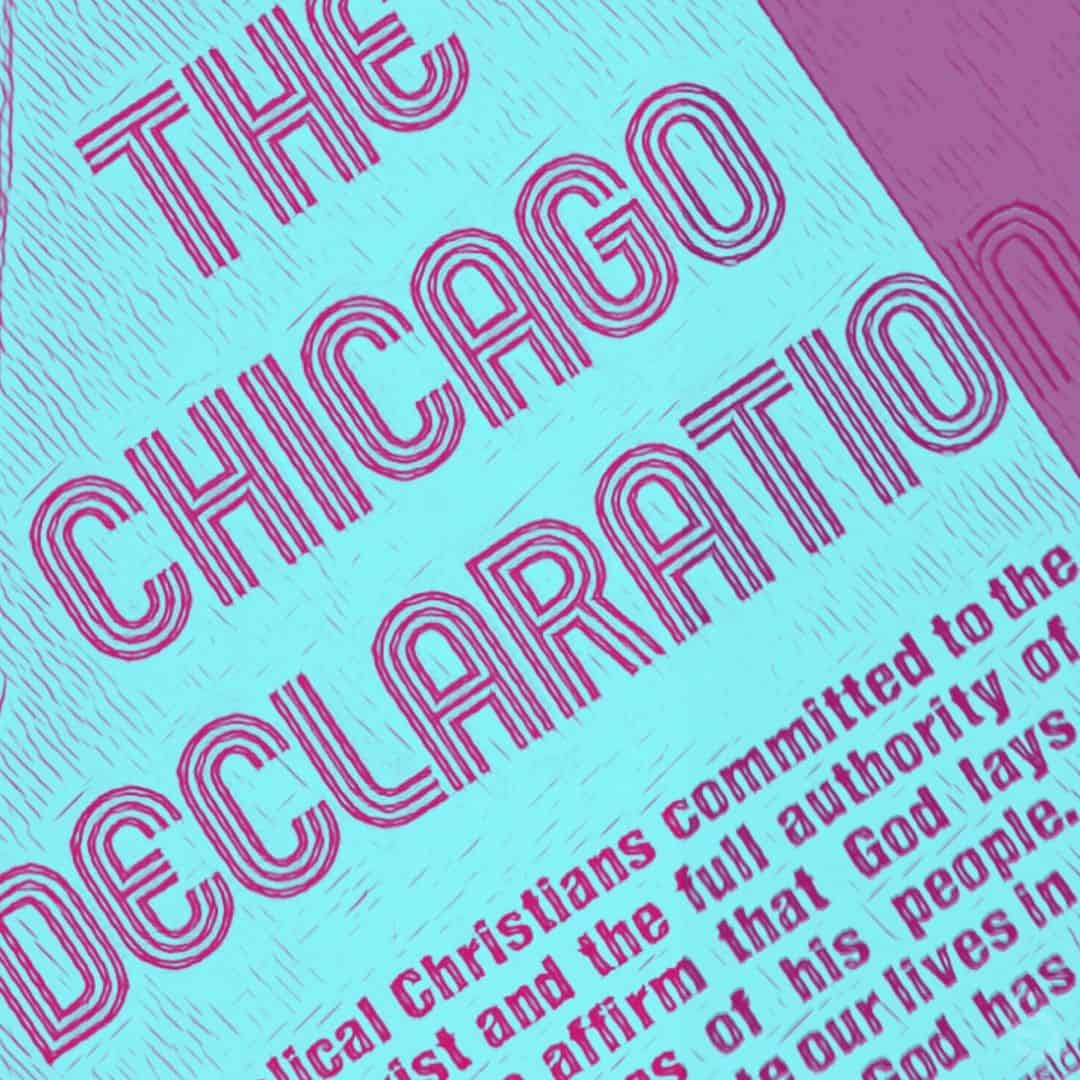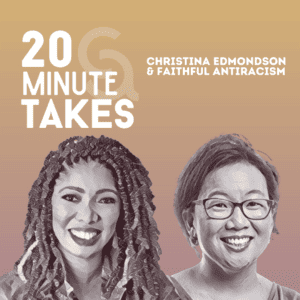 This is the second installation in our Chicago Declaration Series which celebrates the 50th anniversary of CSA’s founding document, the Chicago Declaration of Evangelical Social Concern. The Chicago Declaration, signed by 53 Evangelical leaders in 1973, was written as a call for Christians to engage in issues of justice and to reject racism, economic injustice, violence, and sexism. This month, we highlight essays and conversations on these justice issues in remembrance and celebration of the importance of CSA’s founding document. Read the first installation in this series, The Importance of the Chicago Declaration, here. Today we feature an excerpt of an interview with Dr. Christina Edmondson on the importance of faith-fueled anti-racism work in the church today, led by CSA’s Executive Director, Nikki Toyama-Szeto.
This is the second installation in our Chicago Declaration Series which celebrates the 50th anniversary of CSA’s founding document, the Chicago Declaration of Evangelical Social Concern. The Chicago Declaration, signed by 53 Evangelical leaders in 1973, was written as a call for Christians to engage in issues of justice and to reject racism, economic injustice, violence, and sexism. This month, we highlight essays and conversations on these justice issues in remembrance and celebration of the importance of CSA’s founding document. Read the first installation in this series, The Importance of the Chicago Declaration, here. Today we feature an excerpt of an interview with Dr. Christina Edmondson on the importance of faith-fueled anti-racism work in the church today, led by CSA’s Executive Director, Nikki Toyama-Szeto.
A couple of years ago, we saw a renewed interest, or engagement, within the church around issues of racial justice. And now, a couple years later, here we are. What are some of the things you’re finding from those who are engaging with faithful anti-racism that have kept them going over a longer cycle?
You can think about some of these really horrendous public and recorded assaults and deaths of unarmed African-American people, and the way that people responded to that. So we did see an uptick, for example, when we think about George Floyd’s murder, we saw an uptick of engagement. We saw people literally who’d never protested anything before, taking to the streets and people mentioning it in prayers from the pulpit. And then we also saw, over the course of about a six-month window, a decline of interest, actually lower than what it was before George Floyd’s murder. It was as if people got burnt out of their empathy, of being dialed into this topic. And so, it was a fleeting passion. I would analyze it to say that some of that fleeting passion is because those incidents were not in alignment with the mythology of the American identity. So most white Christian Americans don’t see themselves as the kind of person who would go to a public lynching. But what the camera did is that it brought people to the front row of a public lynching, which is deeply in the history of the American narrative. In the late 1800s to the mid 1900s, we had well over 5,000 lynchings of people of African descent, not to mention other groups as well, right? I think most people don’t want to be the kind of people that [attend a lynching]. But that was not enough to sustain them. And what I have found is that the people who were truly sustained—in the sense of “This is not who I am, and this is not who God has called me to be!”—are the people who then leaned into a biblical hermeneutic of love and justice around the very character of God. They had to go through a re-discipleship that helped to combat the malformation of certain aspects of white Christian Evangelicalism. They had to be re-discipled around these topics! For the people who committed themselves to that, to the re-discipling of the Jesus who is full of love and grace and compassion and justice—they were able to stick longer than the folks who just didn’t like to be the kind of people who saw a lynching.
So the folks who kind of pressed in and re-examined some of the core truths or theologies about the character of God, there’s something about that you think, that was fueling for a longer engagement?
For sure. It also required a change of community or at least a new community in which to grow in. If we stay in the same place where we are being pollinated, that’s not going to work. So it would have had to be the shock and the trauma of injustice, the awareness of it—it would have had to be the reckoning and wrestling with faith that wasn’t just jettisoned and tossed aside—but instead [deepened with with questions like], “Now, wait a minute—who is Harriet Tubman’s Jesus? Hmm…Who is that Jesus?” And are there a people I can be in fellowship with where it’s going to be iron sharpening iron? I’m not going to be able to do this on my own. I’m going to need to be in a community that is going to continue to present this Jesus of grace, mercy, and justice to me. So they would have had to be shocked and then shifted into a community that would have required humility and submission and probably learning from people of Color. And it’s amazing to me how infrequently people do that. They do not just say things like, “Oh I probably should learn from some people of Color about this topic!”
As you outlined in your book different significant moments in history that shaped the environment that formed racism, you pointed out the Doctrine of Discovery and quite a few incidents with the Indigenous and First Nations people in the U.S. Why did you use that as a starting place, and how does that frame the conversation?
Yeah, we have to contend with the mythology of America. When you have the world’s largest religious institution baptizing bigotry on the agenda of greed, and from that creating an entire mythology of the so-called “discovery of a land”—we have a stolen land, and then a stolen people to work it. We have to name that. We have to name the illness, the cancer that’s within the foundation. And that is not all of the American story, but you better believe that is a significant part of the American story. I saw an interview the other day with Ken Burns, the famous documentarian and historian, and he was saying that people often say, “You know you talk a lot about race,” and he’s like, “I know, because it’s everywhere I turn when I study the American story!” I hear that. I’m with him on that. And likewise, I don’t think we can really talk about American Christianity’s relationship with racism if we do not talk about the Doctrine of Discovery, if we don’t reckon with this mutation of Christianity that justified the genocide, stealing, and assault of a people, and that has still not been properly atoned for and repented of today. We still have not made that right, really and truly. I think largely what happens in this mythology is that we act as if they were a people that have now disappeared, which is traumatic, insulting, and disrespectful. So we had to take a seat at the Doctrine of Discovery for us to have any sincere and honest conversation about racism and Christianity in America. And also [to see] just how perverse people can be, how much people can distort Christianity for their own gains, for their own agenda, for their own pockets.
What do you think is the role of the church, the contribution of the people of God in this anti-racism work, in this pursuit of racial healing and flourishing for all people? What do you think is the particular gift that the church or God’s people bring to that broader table?
I would say that for the church of America, it is both the calling and the necessary expression of repentance to engage in racial justice. At bottom, Christians are repenters. We are the people that are like, “Yeah we broke that.” We ought to be anyway! “We broke that, and how can we fix it?” Because of God’s outpouring of grace, we have a creative imagination towards holiness, including social holiness—we ought to have this. It’s a part of our calling, a part of our identity. We are a people who have been reconciled, and we are reconciling—from humanity to humanity. And we are uniquely equipped to be courageous in the midst of suffering and real persecution and real pain, because we have a hope that holds us. So I don’t expect my neighbor who doesn’t claim the same Christian convictions or theological beliefs that I have to be the one who always has to take the risk. I think that we are called as the people who claim to be God’s people, to be the ones who stand up for what is right. I think of those who trained and spent hours and hours preparing their bodies and their minds to endure subjugation and disrespect during the civil rights movement. There was a true training, in old school language, a “buffeting of the flesh” to be prepared to stand one’s ground for social holiness when someone is going to spit on you or kick you or call you names. And I do think that we must continue to reclaim that legacy of preparing ourselves to stand in the gap, as those who God has called. Not to sign up to be martyrs, per se, but to sign up to be courageous. I think that is a part of our calling, and I just think it would be so countercultural to the reputation of American Christianity right now, that we’re not the ones asking you to suffer and sacrifice, but, because we follow a Savior who sacrificed himself, we are prepared to do that.
 This interview is an excerpt from Dr. Christina Edmondson’s interview with CSA’s Executive Director, Nikki Toyama-Szeto on our 20 Minute Takes podcast. To hear their full conversation, listen in here. Dr. Edmondson is the co-host of the podcast Truth‘s Table, as well as co-author of the book Faithful Antiracism: Moving Past Talk to Systemic Change.
This interview is an excerpt from Dr. Christina Edmondson’s interview with CSA’s Executive Director, Nikki Toyama-Szeto on our 20 Minute Takes podcast. To hear their full conversation, listen in here. Dr. Edmondson is the co-host of the podcast Truth‘s Table, as well as co-author of the book Faithful Antiracism: Moving Past Talk to Systemic Change.


